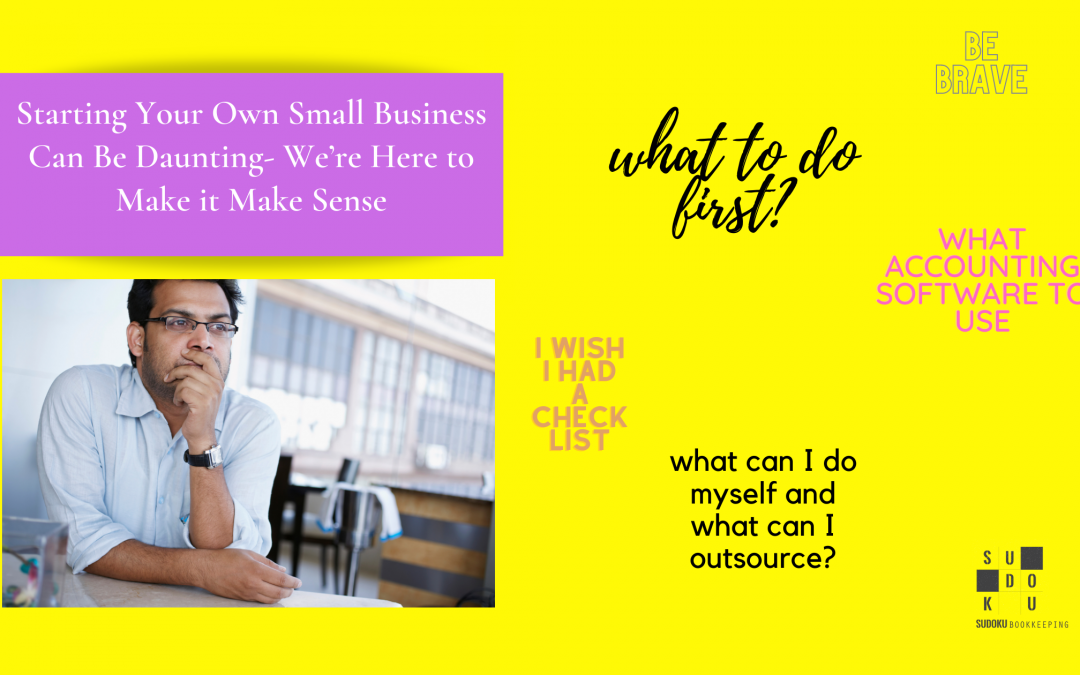Breaking Down Bookkeeping When Starting Your Own Small Business as a Sole Trader
If you’re reading this article, you’ve made the enormous decision to start your own business- congratulations!
Right now, you might be experiencing a lot of feelings. Those feelings can threaten to overwhelm you, so it can help to have a checklist to help you feel organised. There are numerous resources available, including Business.gov.au.
One of the aspects of being a business owner that can be particularly daunting is the financial side. If you don’t have any experience in the numbers field, you may find yourself scratching your head, trying to figure out where to start.
It’s no secret that one of our biggest passions is empowering other business owners to give them complete control and understanding of their financials. We are also strong advocates of business owners doing their own bookkeeping.
To that end, we’ve focussed on bookkeeping tips for freelancers in a recent series. If you haven’t had a chance to read them, we highly recommend you do.
We’ve linked them as part of the checklist at the end of this article.
Here, at Sudoku Bookkeeping, we want to support you in any way we can. We’ve created a comprehensive checklist, plus some key things for you to consider at the beginning of your journey.
You’ve Made The Decision – What Now?
There are many aspects to think about, including:
- Registering an Australian Business Number (ABN) – While an accountant, tax agent, or bookkeeper can assist you with this, it’s easy enough to do it yourself on the gov.au website.
- Business structure: Whether you want to set up as a company, trust, partnership, or sole trader – an accountant or tax agent can help you with this*.
- Business Name: What’s in a name? Well, a lot, actually, since this is what people need to remember when looking for products or services like yours. Deciding on a business name is often one of the most exciting things when starting a business. However, it isn’t as simple as picking a name and running with it. You need to ensure the name is available, which you can do on the ASIC website. If you’re planning on setting up a website, you should also check to see if the domain name is available.
- Create/ Develop your branding and logo. Another fun aspect of setting up your business is creating your logo and branding. While you can do this yourself, we suggest using a graphic designer to come up with a professional logo or branding package for you. DIY logos often don’t look slick enough to be professional, but if you’re on a budget, it’s possible to create your own from a site like Canva.
- Registering an Australian Business Number (ABN) – you can easily do this yourself or see the services of an accountant, tax agent, or bookkeeper who can assist you with the setup.
- Decide if you want to register for Goods and Services Tax (GST): This isn’t essential at this point unless you know you’ll be hitting the $75,000 threshold^ in the first year of business.
- Register as a PAYG withholder, if you’re employing staff^.
- Engage an accountant or tax agent*.
- Engage a bookkeeper – and that’s where we come in^!
At the end of this blog, you’ll find a checklist to help get you started on your small business journey, but in the meantime, we’ll be focussing on your books.
As a sole trader, you’re going to find yourself having to make many decisions on your own, so we’re here to support you in every way we can.
This is My Superpower; What’s Yours?
As mentioned above, you will need to decide on your business structure before taking any of the following steps.
Once you’ve got that covered, we can start helping you with your bookkeeping and accounts.
Below is a list of some of the things we can assist you with:
- Decide on suitable accounting software for your business such as MYOB, Xero or QuickBooks Online (QBO)
- Assist with setting up your software, including payroll setup. The software must be set up correctly to ensure the internal and compliance links are accurate
- Some small business owners like to take control of their bookkeeping themselves or hand it to a family member. While we encourage this, it can be daunting at first, so we can assist with the following:
- Provide software training, but more importantly, train you on the fundamental aspects of bookkeeping and payroll to ensure full compliance with the ATO’s expectations.
- Provide bookkeeping services, either in full or in part including:
- Accounts receivables: sales and invoicing, and customer payments
- Accounts payables: processing your supplier bills and payments
- Payroll
- Bank and other important reconciliations
- Guiding you on how to access MYGOVID
- Provide guidance and information to help you decide how you want to receive your payments, e.g. direct transfer into your bank account, PayPal, Credit Cards or any other merchant facility
- Provide you with easy to follow procedures
- Break down your cash flow and financial reports to help you fully understand your financials
- Set up budgets
- Inventory set up
And Now, What You’ve Been Waiting For… – a checklist for starting your own small business as a sole trader
Below is a Quick Start-Up Checklist to help structure your thoughts when making decisions early in the process.
It’s important to note that there are many things to consider when starting out, so this list isn’t as fully comprehensible as we’d like. There are just too many industries and variables to cover everything, but the basic list below should be enough to get you on the road.
Please note that the guide below isn’t in a set order. If you can’t tick off one of the items, skip to the next, so you don’t get stuck in processes.
Quick Start-Up Checklist (to be used once you have your business idea, ABN, name etc.):
- Develop a business plan*
- Obtain start-up loans*
- Decide if you need to rent premises*
- Obtain business insurances
- Complete any necessary improvement or customisation on the leased premises*
- Do you need to purchase or lease vehicles and equipment?
- Obtain relevant insurance policies*
- Either create or hire someone to build your website*
- If you need employees, you should start advertising and interviewing
- Engage contractors*, incl IT support, bookkeeper, accountant, copywriter, virtual assistant, if needed
- Upskill, if necessary
- Set up processes including marketing and sales*
- Set up policies and procedures*
- Start looking into marketing and lead generation*
- Set up comprehensive record-keeping ^
- Join networking groups
* if required, we can refer you to one of our extensive network of colleagues and contacts
^ we can assist you with this
The blogs we mentioned above that cover various aspects of the financial side of owning a freelancing business are linked below:
Keeping your business compliant with ATO
ATO compliance – How to follow ATO rules and regulations
Payroll Compliance – How to ensure your payroll is compliant with ATO and Fair Work Ombudsman
All of this information may seem like a lot when you are starting your own business, but we want to guide and help you in any way we can. We’d love to hear from you, so feel free to book a free initial consultation with us at Sudoku Bookkeeping Services.

